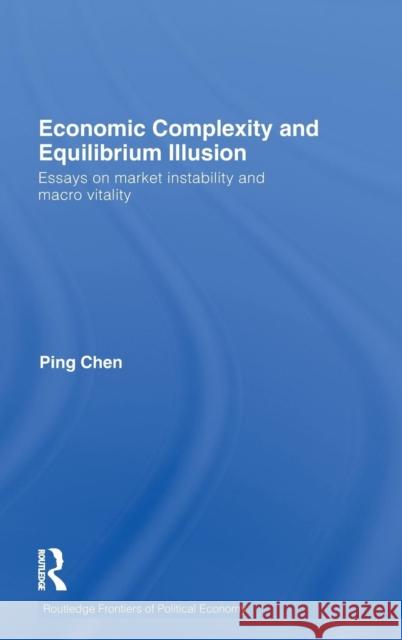Economic Complexity and Equilibrium Illusion: Essays on Market Instability and Macro Vitality » książka
Economic Complexity and Equilibrium Illusion: Essays on Market Instability and Macro Vitality
ISBN-13: 9780415554756 / Angielski / Twarda / 2010 / 400 str.
Economic Complexity and Equilibrium Illusion: Essays on Market Instability and Macro Vitality
ISBN-13: 9780415554756 / Angielski / Twarda / 2010 / 400 str.
(netto: 761,05 VAT: 5%)
Najniższa cena z 30 dni: 730,42
ok. 30 dni roboczych.
Darmowa dostawa!
The Principle of Large Numbers indicates that macro fluctuations have weak microfoundations; persistent business cycles and interrupted technologies can be better characterized by macro vitality and meso foundations. Economic growth is limited by market extent and ecological constraints. The trade-off between stability and complexity is the foundation of cultural diversity and mixed economies. The new science of complexity sheds light on the sources of economic instability and complexity. This book consists of the major work of Professor Ping Chen, a pioneer in studying economic chaos and economic complexity. The chapters are selected from works completed since 1987, including original research on evolutionary dynamics of division of labor, empirical and theoretical studies of economic chaos, and stochastic models of collective behavior. Offering a new perspective on market instability and the changing world order, the basic pillars in equilibrium economics are challenging by solid evidence of economic complexity and time asymmetry, including Friedman's theory of exogenous money and efficient market, the Frisch model of noise-driven cycles, the Lucas model of microfoundations and rational expectations, the Black-Scholes model of option pricing, and the Coase theory of transaction costs. Throughout, a general framework based on complex evolutionary dynamics is developed, which integrates different insights from Smith, Malthus, Marx, Schumpeter, and Keynes and others a new understanding of the evolutionary history of division of labor. This book will be of interest to postgraduates and researchers in Economics, including macroeconomics, financial economics, advanced econometrics, and economic methodology.
Whereas, the Stock market crash in 1987 revealed the inherent instability and remarkable resilience of the market economy, the sub-prime financial crisis symbolized the end of the Reagan revolution of unfettered markets. In short, historical events have shown the severe limitations of neoclassical economics based on linear and representative agent models. The new science of complexity sheds lights on the sources of economic instability and complexity.
This book on economic complexity consists of the major work of Ping Chen, a pioneer in studying economic chaos and economic complexity. They are selected from works completed since 1987, including original research on the evolutionary dynamics of the division of labour, empirical and theoretical studies of economic chaos and stochastic models of collective behavior. Throughout, a general theory based on complex evolutionary economics is developed, which integrates different insights from Marx, Marshall, Schumpeter, Keynes and offers a new understanding of the evolutionary history of division of labour.











